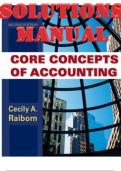Exam (elaborations)
CORE CONCEPTS OF ACCOUNTING 2ND EDITION BY CECILY A. RAIBORN SOLUTIONS MANUAL
- Course
- Institution
CHAPTER 1 SOLUTIONS TO END OF CHAPTER MATERIAL QUESTIONS 1. The three general types of business are typically categorized as follows: service, manufacturing and merchandising. Service example: Manufacturing example: Merchandising example: airline company, e.g. Southwest steel manu...
[Show more]



